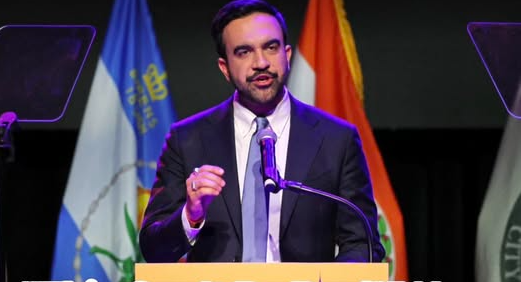Zohran Mamdani stood before a roaring crowd late Tuesday night, his voice cutting through the November chill outside City Hall. The 34-year-old community organizer turned politician had just made history — New York City’s first socialist mayor, first Muslim mayor, and first mayor of South Asian descent. Cameras flashed, chants echoed, and Mamdani raised his hands, beginning a speech destined to be remembered.
“This victory belongs to the people whose hands built this city — fingers bruised from lifting boxes, palms calloused from bike handlebars, knuckles scarred from kitchen burns. These are hands that rarely held power. Tonight, against all odds, we have grasped it.”
The crowd erupted. His words reflected the coalition that carried him to office: working-class immigrants, union members, tenants, and young voters tired of establishment politics. For many, his victory symbolized a generational and ideological shift in city leadership.
Mamdani’s campaign faced fierce resistance from political veterans and Islamophobic attacks online and in the press. Yet his team — grassroots volunteers and labor organizers — outmaneuvered the city’s political machine with a message of economic justice and community empowerment. “They tried to make us afraid of each other,” he said. “They called our dreams too radical, our neighbors too different, our ambitions too bold. But look around — we’re here because we believed in something bigger than fear.”
Born to Ugandan-Indian immigrant parents on Manhattan’s Upper West Side, Mamdani grew up seeing both opportunity and inequality. His mother worked in education; his father, a filmmaker, told stories of migration and struggle. That dual perspective shaped his politics.
Before politics, he worked as a housing counselor and tenants’ rights organizer in Queens, helping residents resist evictions and illegal rent hikes. Those experiences grounded his campaign promise: to make New York a city that works for its residents, not developers.
In his victory speech, Mamdani laid out an ambitious agenda. His first priority: a citywide rent freeze for regulated apartments. “No family should choose between rent and groceries,” he said. “Housing is a human right.”
He pledged to make public transit free, starting with buses. “Every New Yorker should move through their city without barriers,” he said. “We spend billions on corporate subsidies — it’s time to invest in mobility for the people.”
Another proposal: a Department of Community Safety, a civilian-led agency responding to mental health crises, homelessness, and substance-abuse emergencies, replacing police in nonviolent calls. “Safety doesn’t come from fear or force,” he said. “It comes from care, compassion, and community.”
He also promised expanded universal child care, higher wages for city workers, and redirecting tax breaks from luxury developers to social housing and public education. Critics called it “idealism in a budget crisis,” but Mamdani insisted it was political will, not money, that mattered. “Every generation is told we can’t afford justice,” he said. “What we can’t afford is another decade of inequality.”
The crowd — students, union members, cab drivers, nurses — waved signs reading “People Before Profit” and “Our City, Our Future.” The energy was electric.
Mamdani invoked historical figures who shaped him, quoting Eugene Debs: “While there is a lower class, I am in it. While there is a criminal element, I am of it. While there is a soul in prison, I am not free.” He also referenced Jawaharlal Nehru on leadership as service: “We are not here to rule over people. We are here to serve them — to build a city where power rises from the streets.”
“Politics has been treated as something done to you, not with you. That ends tonight,” he said. “City Hall belongs to the people who clean its floors, deliver its packages, and teach its children.”
Mamdani acknowledged resistance from bureaucracy, real-estate interests, and the City Council, but seemed ready. “We’ve already done the impossible,” he said. “We’ve proven money doesn’t always win — people do.”
Analysts call Mamdani’s win one of the most significant shifts in New York’s modern history. His rise reflects other progressive leaders, but few have gained executive power in a city as complex as New York. How he turns grassroots idealism into governance will define his legacy.
In private, aides say he’s assembling a transition team of housing advocates, labor economists, environmental experts, and community organizers, signaling a break from business-as-usual politics. He’s also consulting unions and nonprofits to move promises from podium to policy quickly.
Even amid celebration, Mamdani remained humble. “This victory isn’t mine,” he said. “It’s yours — delivery drivers, teachers, subway operators, caregivers, cleaners. For every person who felt unseen.”
He ended with a challenge: “This movement doesn’t end at the ballot box. If you want rent justice, free transit, dignity for every worker, you can’t go home now. You have to keep fighting. Power only listens when it’s pressed.”
As confetti fell and the crowd chanted, Mamdani smiled — exhaustion mixed with quiet defiance. The son of immigrants who once wondered if this country would welcome them now stood at the threshold of leading its largest city.
For the first time in decades, New Yorkers left a mayoral rally not just cheering a candidate, but believing in the possibility of change. Mamdani looked over the crowd — cab drivers, nurses, fast-food workers, students, mothers with children on shoulders — and said one last thing: “This city belongs to you. Always has. Always will.”
